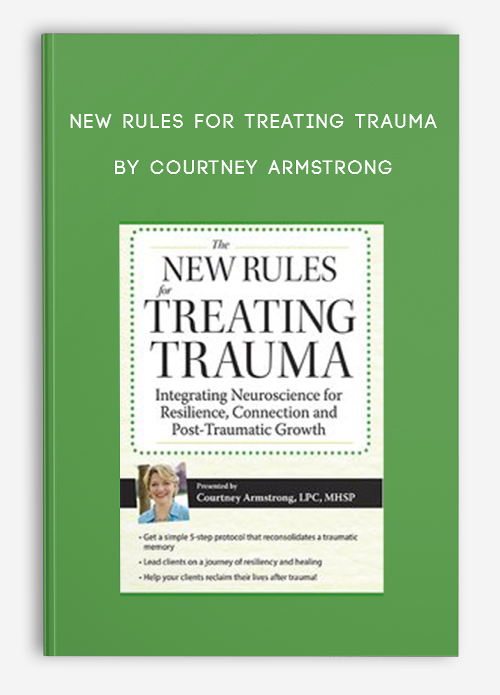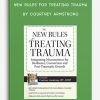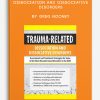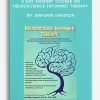

New Rules for Treating Trauma by Courtney Armstrong
$109.00 $29.00
- Description
Description
New Rules for Treating Trauma Integrating Neuroscience for Resilience, Connection and Post-Traumatic Growth by Courtney Armstrong
Faculty:Courtney Armstrong
Duration:6 Hours 36 Minutes | Format:Audio and Video
Archive : New Rules for Treating Trauma by Courtney Armstrong
Get New Rules for Treating Trauma by Courtney Armstrong on bestoftrader.com
Outline:
The Emotional Brain: A User-Friendly Guide
- Simple ways to understand the brain
- A healthy emotional brain & how it develops
- 7 primary emotional systems
- How trauma and disrupted attachment alter the brain
- 3 neuroscience breakthroughs that change how we treat trauma
- Resilience, connection and post-traumatic growth
The 3-Phase Model of Trauma- Informed Treatment
Interventions for Assessment, Safety and Stabilization
- 5 simple questions to assess for PTSD
- Beyond words: build trust and safety with right brain to right brain communication
- Help clients understand trauma responses
- Calm fear with mindfulness and imagery techniques
- Deal with dissociation: practical tools for grounding and orienting
- Shift shame and nurture self-compassion
- Defuse anger with play and humor
- Empower with movement and metaphor
Reprocessing Traumatic Memories: A Less Painful Approach
- Revise not relive: why exposure can retraumatize
- Memory reconsolidation: a mechanism for healing trauma
- 5 simple steps for reconsolidating a traumatic memory
- Create the future-self template and the brain’s blueprint for healing
- Neutralize negative beliefs with resourceful emotional states
- Facilitate corrective emotional experiences with powerful imagery, metaphor, music and movement techniques
Facilitating Post-Traumatic Growth
- The 3 qualities of post-traumatic growth
- Create a positive post-trauma identity
- Nurture a secure attachment system after trauma
- Find meaning and purpose after trauma
- Happiness and the power of intention
Applications for Special Populations
- Sexual trauma survivors
- Childhood abuse and neglect
- Traumatic grief after sudden or violent deaths
- Medical trauma, car accidents and disasters
- Military, police and first responders
- Children and adolescents after trauma
- Cultures and faith traditions
- Prevent burnout and vicarious trauma
Get New Rules for Treating Trauma by Courtney Armstrong on bestoftrader.com
Description:
Were you taught to use medication, CBT, exposure and other traditional therapy approaches to treat trauma? Did you know that these approaches can be limited when it comes to healing trauma at the deeper, emotional level of the brain?
Memory reconsolidation is a recent neuroscience breakthrough that revealed a new way to clear trauma at its roots by process of recalling and updating a memory.
During this recording, I’ll provide you with step-by-step instructions and techniques you can use in each phase of trauma treatment. This is the trauma training that specifically gives you skills in the phenomena of memory reconsolidation. Let me show you why memory reconsolidation is necessary for transforming your trauma work with clients. I will give you a simple protocol to use to reconsolidate a traumatic memory in as little as one session!
Don’t get the impression that you have to get lengthy, expensive training and certification in certain modalities in order to be able to successfully treat trauma. This recording will let you walk away knowing exactly what to do to help your clients reclaim their lives after trauma!
Courtney Armstrong, LPC, MHSP
Courtney ArmstrongRelated seminars and products: 2
LPC, MHSP
Courtney Armstrong, LPC, MHSP, is the author of The Therapeutic “Aha!” (2015) and Transforming Traumatic Grief (2011). She is the director of Tamarisk: A Center for Mind-Body Therapy in Chattanooga, Tennessee. In her 20 years of practice as a licensed professional counselor and grief and trauma specialist, she has helped thousands of clients recover from trauma, reclaim resilience, and experience deep personal transformation.
An affiliate member of the Social and Affective Neuroscience Society, Courtney has a passion for investigating the neurobiology of trauma, attachment, and healing processes and translating research into practical applications therapists can use to get better results for their clients. Courtney has trained thousands of mental health professionals nationally and internationally – combining science with humor, film clips, live demonstrations, and experiential activities so participants enjoy themselves and leave with new tools they can use right away.
She has contributed to publications such as the Psychotherapy Networker, The Neuropsychotherapist, and Counseling Today. She has appeared as a guest expert on CBS Radio News, NPR affiliates, Shrinkrap Radio, and podcasts in Europe, Canada, and Australia.
Speaker Disclosure:
Financial: Courtney Armstrong is in private practice. She is an author for WW Norton and receives royalties. Ms. Armstrong receives a speaking honorarium from PESI, Inc.
Non-financial: Courtney Armstrong is a member of the Institute for Rapid Resolution Therapy.













